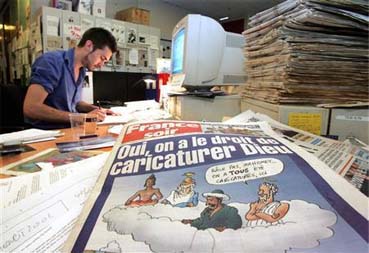

(Left) Aubervilliers, near Paris, France, 31 January 2006. The cover headline of France Soir reads "Yes, we have the right to caricature God"; the balloon text reads "Relax, Mohammed, we have ALL been caricatures before." The original cartoons featuring satirical depictions of the Prophet Mohammed, first published by the Danish Newspaper Jylland-Posten, were reprinted inside. (Reuters photo by Franck Prevel)
(Right) Amman, Jordan, 31 January 2006. The sign reads "No Danish Products." Muslims throughout the world protested against the Danish editorial cartoons with demonstrations, recalls of ambassadors and boycotts of Danish products. (Reuters photo by Ali Jarekji)
Missteps
Let it be said that it was the Danish newspaper Jylland-Posten that added the latest ember to the perennial firestorm.
The Muslims have been unhappy with the West for a very long time. They blame the West for colonizing the Middle East after the fall of the Ottoman Empire, then drawing arbitrary borders for the pleasure of London, Paris and later, Washington and Moscow. They blame the West for modern Israel, the guilt-ridden recompense of an European war that saw to the deaths of eight million Jews, then relocated millions more to impose a foreign nation upon the hallowed land their ancestors had defended against the Crusaders. They blame the West for their tribal conflicts and despotic regimes, all perceived as machinations towards political and material gain, particularly the fossil fuels buried beneath their deserts.
The West, meanwhile, have not been too pleased with the Muslim world, either. They blame the Muslims for justifying violent acts of defiance with religious zeal, equating terrorism with martyrdom. They blame the Muslims, even those who already live amongst them within their open, secular societies, for their own fear of losing their cultural pre-eminence to the sight of women wearing headscarves.
Mistrust and resentment beget prejudice, now to such an absurd extent that even making a statement about prejudice becomes a prejudicial act in itself. When a newspaper cartoonist drew bombs tucked inside the turban of the Prophet Mohammed (peace be with Him), he was merely evoking the very real perception that terrorists commit their crimes in the name of Islam. That idea has been irking the Muslims for so long, though, they would condemn its expression with all their decades-long ire.
|
To Western eyes, these petulant protests only did further disservice to the Muslim world, perpetuating its undeserved caricature as a paranoid society, one so eager to draw a battlefront in any setting. |
The editors should have seen it coming. These are the times when clerics can issue bounties for the heads of blasphemous novelists and filmmakers, and blasphemy, as defined in Islamic tradition, can be any invocation of the Prophet other than a solemn psalm of praise. Salmon Rushdie survived his long death threat; Theo Van Gogh did not. |
If the Danish journalists -- now joined by their Norwegian, French, British, German, Italian, Spanish and Polish colleagues in reprinting those cartoons -- erred in their provocative statement, so did the leaders of the Muslim world in their gross overreaction. The imams could have properly protested against the distasteful cartoons by submitting letters and commentaries to the newspapers that published them: that is, by participating the very cultural dialogue being carried on by the Western media, in a forum where both sides of the debate would enjoy their right of free expression.
Instead, they called for a boycott of all Danish products (mostly meat and dairy goods in supermarkets), hurting Danish businesses, their employees and regional associates who had nothing to do with the editorial cartoons. The Muslims in their home countries might only want to vent their indignation by stomping and burning the Danish national flag, withdrawing ambassadors from Copenhagen, and issuing death threats to Danish journalists -- after all, they've had that sort of sissy-fit before. Surely even they could see that things have gone too far when riots broke out in Damascus, where the Norwegian embassy was torched, or in Meymaneh, Afghanistan, where eight rioters died whilst clashing with Nato peacekeepers guarding a Norwegian-led military base.
To Western eyes, these petulant protests only did further disservice to the Muslim world, perpetuating its undeserved caricature as a paranoid society, one so eager to draw a battlefront in any setting. At the worst, the rioters would provoke their ugly counterparts in the West, right-wing xenophobes who are now making their way into the European political mainstream, thus acquiring the mandate to diminish the rights of their fellow Muslim citizens, starting with their choice of garment.
This commentary is yet another free voice in the din of the West. As such, it freely criticizes both sides of this cultural clash, but makes recommendations that, in all practicality, only a Western audience can heed. Well, they have to start somewhere.
The real, common enemy to both sides is prejudice, and it must be fought at the most basic level. In the pubs and restaurants of Copenhagen, Paris and Berlin, ordinary people with any good sense left in them must remind themselves that, just as they know their dark-skinned friends would not hide a bomb in their waistcoats, their light-skinned friends would not spray-paint swastikas on their walls.
Perhaps, guided by our everyday experience of trust and bonhomie, our media may then address legitimate grievances voiced by the Muslim community with greater sensitivity and restraint.
P.S. Hey Denmark, sell more of your delicious hams, cheeses and butter cookies to the Americas! We love them here!
-- CW, 2 February 2006, updated 5 February 2006 (information source: British Broadcasting Corporation)
| Back to top |
